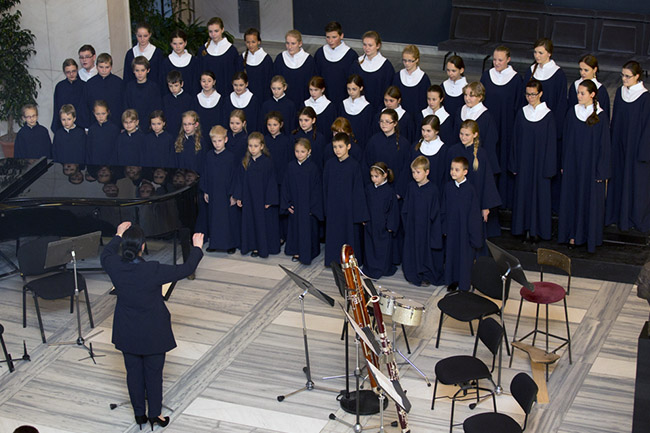Brno Children´s Choir (together with the Miloslav Ištvan Quartett)
Leoš Janáček Little Queens
Bohuslav Martinů A selection from The Chap-Book – version for a children´s choir and piano
Karel Reiner The Flowered Horse
František Domažlický Czech songs for a children´s choir and a string quartet
Brno Children´s Choir
choir master Valeria Maťašová

Brno Children´s Choir, which has been an inseparable part of Brno’s opera scene since 2004, performs in this concert in the foyer of the Janáček Theatre. Apart from regular participation in opera performances, this children´s choir has had a lot of success with their concert activities.
Little Queens – “Old national ceremonial dances with singing” is a charming composition by Leoš Janáček (1854–1928) from 1889, i.e. from the beginning of the composer´s intensive interest in Moravian music folklore. Parades featuring young girls, or “little queens”, are one of the oldest ceremonial folk customs connected with the arrival of spring. In 1888, an 11-part ceremony of this type took place thanks to a representative of the ethnographic movement, Lucie Bakešová, in Ořechov near Brno as part of an exhibition there. Janáček often cooperated with the Bakeš couple, and thus shortly afterwards he created a piano accompaniment for the Ořechov Little Queens which charms people even today with its musicality and touching simplicity. Other adaptations of Little Queens have also been created, for instance by the composer and conductor Karel Kovařovic.
The interest of Bohuslav Martinů (1890–1959) in old Czech games and rhymes inspired him to compose The Chap-Book. He carried out his first attempt at composing music based on old Czech rhymes in his female choirs. In Paris, 1930, he was hit by the idea of composing a folk theatre work – The Chap-Book. He only had Erben´s collection of rhymes with him but found further inspiration in the Czech rural tales found in Božena Němcová´s books. However, this still wasn´t enough and so Martinů went through the archives and put together a collection of materials for transformation into music. The first piece produced was The Legend of Saint Dorothy in January 1931, from which he proceeded to the complete composition. He finished the work in February 1932 with Erben´s The Wedding Shirts, though this was left out of The Chap-Book in the end. Martinů mainly wished to create a staged folk play, and intentionally used very simple means in order to emphasise the folk lyricism of the whole work. Originally, The Chap-Book was intended for a chamber orchestra but he re-instrumented it in 1940. A selection from this work will be presented at the concert, with piano accompaniment.
The Flowered Horse by Karel Reiner (1910–1979) is a collection of poems, plays and rhymes for solos, children´s choir, recital and piano, with lyrics by Norbert Frýd. Frýd worked in the Terezín ghetto as a tutor and his Alphabet of The Flowered Horse was part of the local ABC book. Together with Karel Reiner, he prepared a series of rhymes and song texts for children and their performances which were produced and acted out in the so-called Jugendheim where children lived together with their tutors.
The purpose of these performances wasn´t primarily educational but rather psychological – the aim was to enable the smallest involuntary inhabitants of the ghetto to forget about their separation from their loved ones and the traumas they were experiencing, at least for a while. The Flowered Horse was performed there in December 1943.
František Domažlický (1913–1997) (real name Tausig) was also deported to the Terezín ghetto and subsequently to several concentration camps. Just like Karel Reiner, he was lucky and survived. After the war, he studied at the Prague Academy and made his living as a violist in various orchestras. Apart from this activity, he was also a composer. His music is built on a tonal base and on melody with a distinctly lyrical accent. Czech Songs for three female voices or a female or children´s choir and string quartet op. 17 was created in 1955.
Jiří Zahrádka

